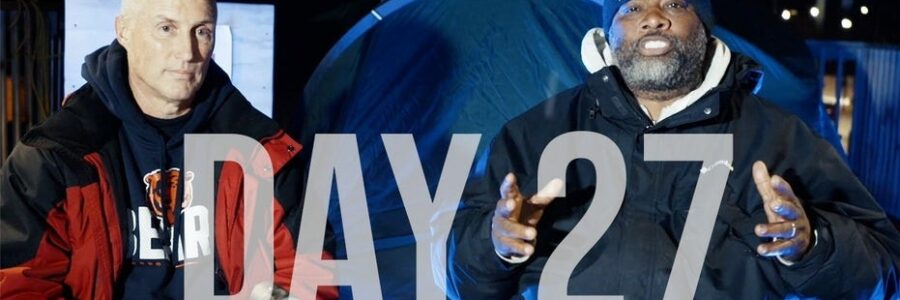
Chicago rooftop revelations: Mentorship is the key to transforming people's lives for the better, pastor says
ROOFTOP REVELATIONS: Day 27 with Pastor Corey Brooks
CHICAGO – On the 27th day of Pastor Corey Brooks’ 100-day rooftop vigil on the South Side of Chicago, he met with a realtor named Jim Purcell who flew in from Athens, Georgia, to spend a night on the roof. What bonded these two men was their commitment to mentoring youths. It did not matter that these two men came from different races, different backgrounds and different parts of America; they saw that youths in their areas needed mentors, and they stepped up.
As the rooftop campfire burned brightly, the pastor asked Purcell what led him to become a mentor. He replied that it was simply just having “a heart for the people that are having to live in conditions that just don’t really seem right.” He credited Hals Farnsworth, an Athens pastor at Redeemer Presbyterian Church, for inspiring him.
Like Purcell, Farnsworth had been troubled by the sight of seeing people “struggling through poverty so bad” and felt compelled to do something. “His question was, how can I bring the Black community together with the White community and form a common bond,” said Purcell. “And he decided football was [the common ground] and he started a program called Downtown Falcons.”
Brooks related to what Purcell was saying.
“That’s really important, because we’re living in a day and time, especially in Chicago, where people want to think that a lot of our problems are a result of racial issues. And I beg to differ,” the pastor said.
“I think all the problems that we’re faced with, if we all work together – and I say this a lot about being neighborly, if we can just be neighborly – there’s absolutely nothing that we can’t overcome,” he continued. “I know for you, you’ve been a mentor, and we’re really big on that.”
For the pastor and Purcell, being a mentor is far more than the act of volunteering. One of the challenges of being a mentor is that one must not only possess guidance, but the wisdom of how to dispense it so that it lifts up the youth. And a mentor can only give rightly if he or she truly sees the full human being before them.
For these two men, the issue of race lessens the effectiveness of this process, for it reveals little to nothing about a person from the outset. There are far more important human qualities like talent, interests, needs and aspirations to unite on than race.
“Some of the kids I had the most trouble with on my team just really want some attention,” Purcell said. “They wanted to know that I loved them and I cared about ’em and that goes all way from childhood to adulthood.”
As Purcell got to know the first group of kids that showed up, he and the other mentors realized that the kids needed and wanted more. The football program, which had grown to 300 kids, expanded to include basketball teams. Then a school was added to give these youths the fullest range of opportunities.
CLICK HERE TO GET THE FOX NEWS APP
Brooks could only smile. He’s been traveling down this path his entire life. And that is why he sits on top the roof today with the goal of raising enough funds for his dream: building for his community center named Project H.O.O.D. (Helping Others Obtain Destiny).
From Athens to the South Side of Chicago and beyond, mentorship is the key to empowering countless youths to transform their lives for the better.
“I tell people all the time that government can make laws, but they can’t change hearts,” the pastor said. “It is God and people that work on the hearts.”
For more information, please visit Project H.O.O.D.
Eli Steele is a documentary filmmaker and writer. His latest film is “What Killed Michael Brown?” Twitter: @Hebro_Steele.
Camera by Terrell Allen.
Source: Read Full Article
